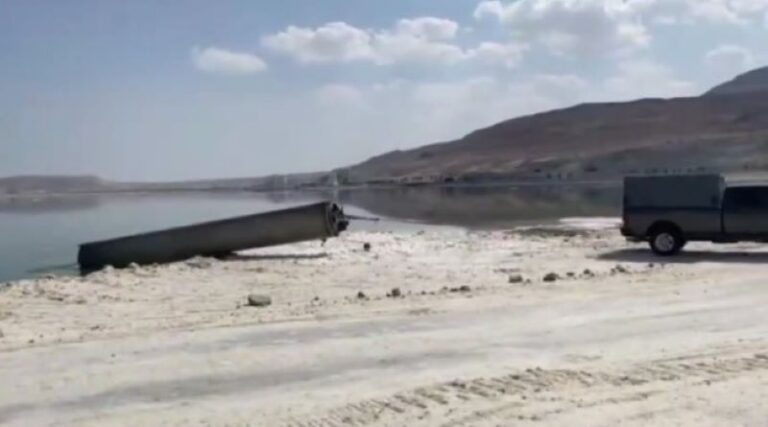When President Donald Trump visited Beto O’Rourke’s hometown to argue that walling off the southern border would make the U.S. safer, the former Democratic congressman and possible 2020 presidential hopeful was ready.
As the president filled an El Paso arena with supporters, O’Rourke helped lead thousands of his own on a protest march past the barrier of barbed-wire topped fencing and towering metal slats that separates El Paso from Ciudad Juarez, Mexico.
O’Rourke clearly hopes to make his personal experience with the border a strength if he runs for president — and the battle over billions of dollars in new fortifications may well shape the 2020 campaign.
But O’Rourke’s history with the barriers that have lined the Rio Grande since he was a child actually could be a bit of vulnerability, too.
As the 2020 campaign is joined, other top Democrats can oppose Trump’s call for more and larger walls as a straightforward wedge issue — something they say shows anti-immigrant feeling, intolerance and even racism.
But O’Rourke’s record on border walls is complicated. In March, he supported a spending package that other leading Democratic contenders opposed and included $1.6 billion for border wall construction in Texas’ Rio Grande Valley and elsewhere. Buried in that was $445 million for repairs of existing fencing elsewhere — including El Paso.
O’Rourke later explained the vote as a compromise to win approval of another proposal he backed, expanding access to mental health care for military veterans who had received other-than-honorable discharges. But his action attracted criticism from people who know the border best. Scott Nicol, co-chairman of the Sierra Club’s Borderlands team, called it “very disappointing.”
“The things that he has said have been dead on,” Nicol said. “The next step becomes what do you do.”
O’Rourke’s nuanced position on border barriers, sometimes willing to use them as a bargaining chip, could be politically awkward in a national campaign but it’s shared in El Paso. Here, many people accept dozens of miles of existing walls as a fact of life, objecting mostly to structures so intrusive they suggest a war zone.
“People in El Paso live with the border and the ambiguities and contradictions of the border,” said Josiah Heyman, director of the University of Texas at El Paso’s Center for Interamerican and Border Studies.
In an interview Thursday night on MSNBC, O’Rourke said he would “absolutely” tear down El Paso’s existing walls and that he believed a majority of residents would back doing so.
That somewhat contradicts his past statements about opposing entirely open borders, but O’Rourke has previously backed having them porous enough to promote trade and immigrant culture. In an interview in 2006, he decried President George W. Bush’s proposal for bolstering the existing walls with more surveillance technology.
Bush’s barrier “didn’t seem like a meaningful suggestion at all, but maybe that’s because we already have it and it doesn’t seem to be working,” he said.
A day later, presidential candidate Sen. Kirsten Gillibrand (D-NY) said she would be open to the idea of tearing down the wall.
“Well I would have to ask folks in that part of the country to see whether the fencing today is helpful or unhelpful,” she told reporters. “You know, Democrats are not unafraid of national security or border security. Democrats have funded border security for decades.”
Gillibrand further stated Democrats just don’t want a “medieval” wall made out of concrete along the entirety of the U.S.-Mexico border.
“It is a hateful message. [Trump] is trying to create a picture of division and hate and derision and that’s what I’m so offended by. The fact that he spews this kind of racism in his words and actions is troubling,” she continued. “So I could look at it and see which part he means and if it makes sense, I could support it.”
City Council member Peter Svarzbein said El Paso’s character isn’t based on keeping people out, but rather on tens of thousands who legally cross every day for work, school, shopping or to see bi-national relatives.
Democratic analyst Colin Strother noted, “There are places that physical barriers make sense, but it does not make sense everywhere and that seems to be the big disconnect.”
O’Rourke’s attempts to explain his record could be difficult in a hotly contested primary campaign. His 2020 rivals could run into their own complications on the issue soon, however, after Congress approved $1.4 billion in new border wall money as part of a deal to avoid the latest government shutdown.
In the end, O’Rourke “may have some firsthand knowledge, but I don’t know if it’s a winning argument,” said Democratic political consultant James Aldrete, who helped conduct Hispanic outreach for Barack Obama and Hillary Clinton.
El Paso had only limited border security before 1978 when, facing an influx of immigrants looking for work in the U.S., Congress approved chain-link fencing later dubbed the “Tortilla Curtain.” A 1986 federal law granting legal status to about 2 million Mexicans in the U.S. made the prospect of heading north even more attractive.
Eventually, thousands of people were pouring into El Paso every day, sometimes paying as little as a quarter for rides on makeshift rafts over the Rio Grande.
“People could cross whenever they wanted,” said Silvestre Reyes, who was chief of the Border Patrol’s El Paso sector in 1993 and won a congressional seat in 1996. “The city was tired of it.”
Reyes ordered around-the-clock patrols and authorities repaired 100-plus holes in nine miles of fences downtown.
But when O’Rourke, then an upstart ex-City Council member, ran against Reyes in the 2012 Democratic primary, he didn’t make Reyes’ border crackdown an issue. Instead, O’Rourke more frequently complained of long wait times for cars crossing into El Paso from Juarez.
O’Rourke now opposes pumping any money into new walls. Instead, he’d like to see a coalition of border Democrats and Republicans in Congress hammer out a broader immigration overhaul.
“We know that there is no bargain where we can sacrifice some of our humanity to gain a little more security,” O’Rourke told an emotional El Paso rally he headlined after the Trump protest march. “We know that we deserve to, and will, lose both of them if we do.”
Reyes doesn’t agree with O’Rourke on much but also opposes erecting concrete walls, which Trump has supported in the past.
“We have a lot of slats where you can still see through it,” he said of El Paso. “That helps Border Patrol agents, but it also is supported by people living at the border.”
(AP)







2 Responses
When will these people stop being insane… Seriously, what is going on?!
ah ha: agree with you. It sounds completely unsane. President Trump proposes to protect his country against
druglords and other scum and the left says “no thank you”. This proves the Dems are in the same pact as the
other communists all over the World. Perhaps Hashem Wants it like so? It Says We will witness very strange things
completely ouf of any logics before the coming of the Moshiah.